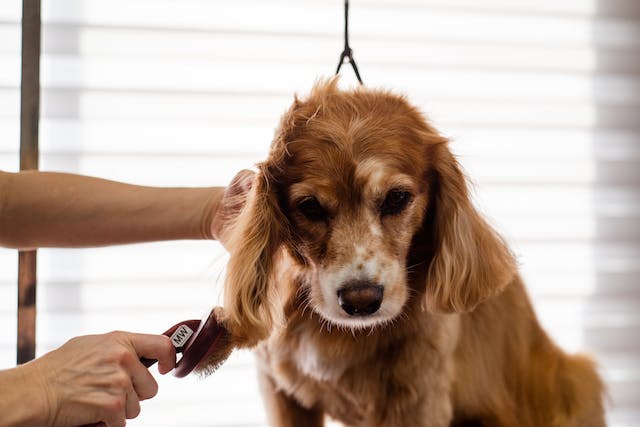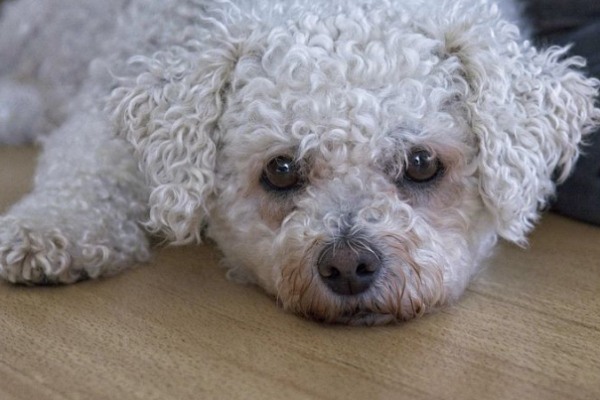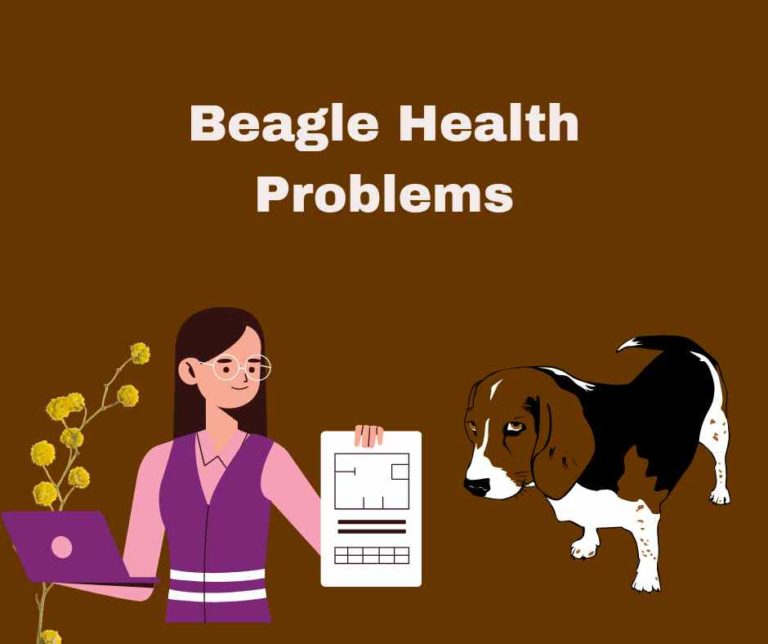10 Common Signs Your Yorkie Is Dying & Ways To Comfort Them

Signs your Yorkie is dying is always devastating to Yorkie owners because you will see a lot of changes, which I will be discussing in this post.
After discussing the most common signs your Yorkie is dying, I will also highlight some common ways to make them comfortable in their dying days.
I will keep things as simple as possible, so keep reading…
Signs Your Yorkie Is Dying
Decreased mobility rate, changes in behavior, significant weight loss, decreasing breathing rate, lack of interest in anything, loss of appetite, and finally increased self-isolation are the most common signs your Yorkie is dying.
These are not the only signs but just the most common signs, that being said let’s take a dive into these signs one by one and also discuss other signs.
So, grab a cup of coffee, and let’s break down these signs…
The following are the most typical indicators of death that you should be aware of and comfort them with:
1. Reduced appetite
A healthy Yorkie loves food and will stop at nothing about getting a treat or something to eat.
When a Yorkie is close to his last days on earth all these interests in food or treats keep reducing as time goes by.
As a Yorkie’s body cells age, its internal organs degrade, which might lead to your Yorkie rejecting meals on a frequent basis.
A change in your Yorkie’s appetite may be caused by a number of things, so it’s not always a sign that he’s dying.
Yorkies, on the other hand, often stop eating or change their feeding habits as their last day approaches.
Unexpected changes in your Yorkie’s eating habits are concerning and may indicate that the end is close.
2. Changes in temperaments
Your Yorkie’s health will continue declining towards the end of its life, as you might anticipate and this will greatly reflect on your Yorkie’s temperaments and behaviors.
They might be unwell, in pain, worried, and going through a lot of changes at the same time.
This can annoy them, prompting them to growl or snap at you when they wouldn’t normally do so.
It’s possible that your Yorkie is in discomfort and is terrified of you pushing the incorrect location.
Regardless, any abrupt behavioral changes in your Yorkie should be reviewed with your veterinarian.
3. Fluctuations in body temperature
A dying Yorkie will find it hard to regulate its body temperature when the time is near, this is because there are lots of activities going on with the Yorkies internal system.
The usual body temperature of a Yorkie is 101 to 102.5 degrees Fahrenheit, which is significantly higher than the average human body temperature (97.6 to 99.6 F).
This body temperature keeps changing when your Yorkie is close to the end and most times you will find your Yorkie chill.
Make sure you keep them warm and talk to your veterinarian.
4. Bladder issues
Loss of control of the bladder is one of the most common signs your Yorkie is dying.
Keep a watch on your Yorkie’s toilet habits, since an uncontrolled bladder and anal sphincter control are two more symptoms that he’s on his way out.
Your Yorkie will urinate and defecate in unexpected regions over which he has little control as he approaches death.
Even the most well-behaved or well-trained Yorkies might be fooled by these clues. Urination will be unpredictable and irregular.
Your Yorkie will have watery diarrhea that is occasionally foul-smelling and sometimes blood-tinged as he approaches death.
Due to a complete lack of muscular control, your Yorkie will urinate and defecate for the last time after death.
5. Decreased mobility rate
As he or she approaches death, your old Yorkie’s mobility will diminish more than usual.
An aged Yorkie’s strength may diminish to the point where he or she is unable to stand as long as previously.
The legs of your Yorkie may become tired, making it difficult for them to climb stairs or cross slippery surfaces.
Your Yorkie may eventually struggle to stand and move, and some may even struggle to lift their heads.
One of the final stages before your Yorkie quits up is a decrease in movement speed. This will be clear, and you should expect to see it.
6. Significant weight loss
Yorkies like to eat less as they become older, which can lead to severe weight loss, which is frequent in senior Yorkies.
Some Yorkie owners would find this difficult to observe or experience, and going through it with their Yorkie would take a lot of fortitude.
If your Yorkie’s weight loss continues after your veterinarian has ruled out all other causes, it’s time to say goodbye.
Degenerative diseases such as chronic renal or hepatic insufficiency, as well as cancer, can cause your Yorkie to lose weight, leading to death.
One of the causes of weight loss in elderly Yorkies is muscle atrophy due to aging.
7. Decreasing breathing rate
You may notice that your Yorkie takes longer to inhale and exhale, or that he or she has trouble catching his or her breath.
Heart failure or respiratory system disorders are the most prevalent causes of breathing difficulty.
Your Yorkie’s respiration grows shallower as it approaches death, with very long intervals between breaths that can last anywhere from a few days to a few hours.
8. Extreme fatigue
You’ll notice that your Yorkie, who used to be active, now likes to lie down and not move.
Due to a lack of energy, they will be unable to lift their heads, and even when called, your Yorkie will not respond as expected.
Your Yorkie might spend the entire day in bed, not coming up to greet you as he usually does.
Anemia, a lack of energy, or poor circulation can all contribute to fatigue.
It’s most likely anemia if your Yorkie’s gums are white instead of a healthy pink.
9. Loss of coordination
It’s probable that your athletic and energetic Yorkies are losing their sense of coordination if you notice them shivering, tripping, or having trouble controlling their muscles.
Coordination problems can be caused by underlying diseases, ear infections, or other injuries, and they might be a sign that your Yorkie is nearing the end of his life, depending on his age and present condition.
Contact your veterinarian if you notice a chronic lack of coordination or are concerned about your Yorkie’s stability.
10. Muscle tremors
A lack of food can induce muscle tremors in Yorkies, and as a result, your Yorkie may get dehydrated and suffer muscular tremors.
When your Yorkie doesn’t eat or drink, his glucose levels decrease, producing weakness and muscle spasms.
If you’re not acquainted with tremors in Yorkies, they’re characterized by twitching, shaking, anxiety, and a drop in body temperature.
The greatest thing you can do for your Yorkie is to make sure he or she is well-fed and warm by putting a blanket over him or her.
Spend some time hugging your Yorkie and talking to your vet to make it warm and comfortable in its final days.
Let’s highlight ways to care for a dying Yorkie…
How to help a Yorkie live longer
Here are some typical techniques to ensure a long and happy life for your Yorkie:
- Provide a well-balanced and healthy diet for your Yorkie with the help of a qualified veterinarian.
- Work to strengthen your Yorkies’ immune system at all times, by adding supplements or fruits to his diet.
- Ensure that your Yorkie has access to clean, fresh water at all times and avoid excessive dehydration.
- Fillers, artificial preservatives, a lot of wheat, and a lot of soy should all be avoided.
- To help your Yorkie maintain a high level of energy, feed him a high-protein meal.
- For your Yorkie, stay away from carcinogens like smoked meat.
- Put your Yorkie in a stressful environment as little as possible.
- Ensure that your Yorkie gets groomed on a regular basis.
- Anxiety for your Yorkie should be prevented at all costs.
- Make a comfortable and relaxing resting spot for your Yorkie.
- Always take your pet to the vet on a regular basis.
Ways to care for and comfort a dying Yorkie
The following are some typical methods for comforting and caring for a Yorkie that is dying:
- Ascertain that your dying Yorkie is in a calm and comfortable setting.
- Provide your dying Yorkie with the medical care and medications required.
- Extensive training or new activities should be avoided or reduced to the absolute minimum.
- Maintain a higher-quality food supply for your dying Yorkie, as well as a water dish.
- Keep a healthy and low degree of anxiety-inducing stress on your dying Yorkie.
- Make sure you provide plenty of blankets or cover him up if he becomes cold.
- Carefully approach your dying Yorkie and gently touch him to avoid frightening him.
- Smaller meals should be given to your dying Yorkie at regular intervals.
- It’s critical to understand your dying Yorkie may demand solitude during his dying days.
- Before using pain relievers or homeopathic remedies, visit your veterinarian.
- You can use appetite stimulants to ensure that your dying Yorkie eats.
- Pet your dying Yorkie as often as you can while controlling your emotions.
- Make sure your dying Yorkie has water and food close to his sleeping spot.
- Avoid dehydration and exposing where your dying Yorkie sleep to direct sunlight or heating it up.
With the information provided on this page, I strongly hope your concerns about Signs Your Yorkie Is Dying were resolved!
Cheers!!!





![How Dogs Get Heartworm [2 Possible Ways] How dogs get heartworm](https://petcreeks.com/wp-content/uploads/2021/07/how-do-dogs-get-heartworm-768x644.jpg)
